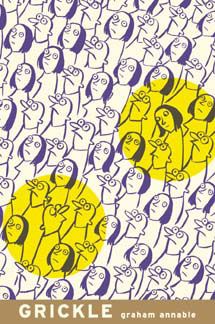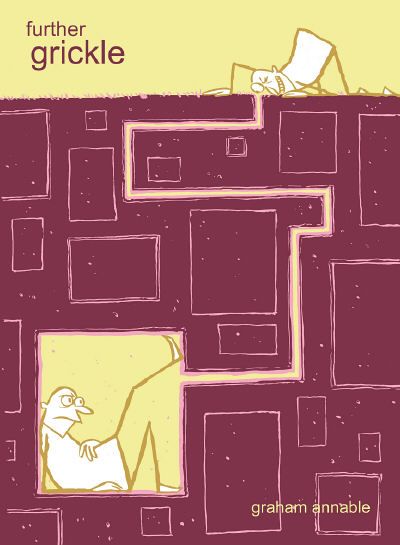Graham Annable has been publishing his comics for so long -- easily a decade or more now -- that it's seems striking that his unique brand of pitch-black comedy, his prolific production rate or his ability to move back and forth between animation and printed work (he has a day job as a storyboard artist at Laika Entertainment) with such seeming effortlessness hasn't won him more accolades.
Dark Horse is attempting to rectify that situation with their release of the Book of Grickle, a hand-selected "best of" that features a number of short stories originally published in the now out-of-print books Annable did way back when for (I'm guessing defunct) Alternative Comics.
Annable took time out from his busy schedule to conduct an email interview with me and talk about the new book, how he fell into comics and where the word "Grickle" came from anyway.
Q. I wanted to start off by asking you how this particular collection came to be? Did Dark Horse contact you or were you shopping around for someone to publish this book?
A. I had chatted with Diana Schutz at numerous conventions over the years and we always talked about me doing something with Dark Horse. But what that specifically was I could never quite envision for myself. About a year ago I was struck with the notion that I'd love to do a collection of my past work along with some self published stories that a lot of people hadn't seen. The first Grickle book had been out of print for nearly 5 years already and the timing seemed right. I immediately thought of Diana and Dark Horse and pitched the idea to her. Diana was stoked on it and everything kind of fell into place after that.
Q. You've had a lot of short stories published in various anthologies in addition to the Grickle series. How did you decide what to keep and what to leave out? Does this collect all the material from your Grickle comics or just a select few stories?
A. Everything I've created for the Grickle comics has been about following a particular whim or theme that appealed to me at the time. I carefully went back over all the stories and picked out the ones I felt would best represent a collection of my overall work. The Book of Grickle doesn't contain everything I've ever created but it represents the best and most interesting work I personally feel I've done.
Q. What's the significance of "Grickle" anyway? Does it mean anything in particular?
A. Grickle is a nickname, amongst a billion nicknames, that my father used for me as a kid. Pretty much every week he'd have new ones he'd be trying out on me and my sister. Grickle is the one that really stuck with me. When I put together the first self-published booklet of short stories I was really perplexed as to what to title the whole thing. Grickle just felt right. And it still does.
Q. Give me a little bit of background/biography. Where did you grow up? How did you get interested in art and comics?What made you decide to take the leap into becoming a professional cartoonist?
A. I grew up in Sault Ste. Marie, Ontario. Basically at the Northern tip of Michigan on the Canadian side. From an early age I've been a hoarder of books. Especially paperback collections. I had stacks and stacks of Peanuts and Archie digests. I think a lot of that stuff affected my brain. When I was about to graduate from high school I was seriously considering going into biology. But as I was looking over my science books I realized they were almost all illegibly covered in doodles. I decided at that point that I'd try and pursue cartoons instead.
Q. How did you develop your style? It strikes me as very unique in that it's very minimal, especially in its character design, but allows for a good bit of detail where backgrounds and facial expressions are concerned. Who are some of your influences?
A. I've been obsessed with finding the quickest, simplest way to convey my ideas. I think I've got a short attention span for things and so once I get an idea I want to be able to execute it and move on to the next one. It's definitely the kind of art and cartooning I like to look at most and it's what I'm always trying to achieve with my work. A lot of it probably comes from reading all the Peanuts strips as a kid. Schulz always said so much with so little in his drawings. Other influences and artists I admire are Harvey Kurtzman, Matt Groening, Charles Addams, Lewis Trondheim, and Seth. There are a ton more I'm not thinking of right now but those fellows come to mind first.
Q. One of the things that strikes me about you and your work is that you're incredibly prolific, which astounds a slacker like me. How are you able to do that? What's your work day like?
A. I think it's all tied my short attention span and maximizing my effort when I'm focused on stuff. I almost always have a number of different little projects going on. I hop around on them based on my level of inspiration and deadlines. Doing short, concise, things where I can see the light at the end of the tunnel is the best. It's gets a lot tougher for me when they turn into bigger ventures. I really just enjoy chasing whatever is inspiring me at the time and creating as much art as I possibly can along the way. There's no better way to spend your day than that for me.
Q. You work in animation just about as much as you do in comics? Do you prefer one medium to the other? What's the appeal of working in animation? What does it give you that making comics doesn't and vice versa? How did you get started down that particular road?
A. It's always a case of how inspired I am about an idea and whether I've envisioned that idea to be in comic form or animated. The wonderful thing about film is that moment when you marry sound to the visuals. The combination of the two elements lifts the piece into a whole new realm. It's the most exciting thing for me in creating the animated shorts. Comics allow the audience to read the story at their own pace and linger over the language and expressions. There's something really comforting and nice in that. For the stories I come up with I almost always know right away whether I'll want to pursue it as a comic or an animated short. One medium just feels right over the other depending on the idea. I've been involved in animation for quite some time. I graduated from Sheridan College's classical animation program back in 1992. And have been working professionally as an animator in tv, film, and video games pretty much ever since. Although currently occupation I'm a storyboard artist at Laika Entertainment in Portland, Oregon.
Q. Along the same lines, are there any art mediums you haven't tried yet that you'd like to? (I.e. children's books, straight prose, etc.)
A. I would definitely welcome the opportunity to do children's books. I've been doing more spot illustration work for gallery shows over the years and it's been very fun to explore that direction. I don't know if straight prose would work well for me, I think the visual movement
and expressions are what save my stuff from being too sparse or boring. Without that element I think I might be sunk as an artist. Only using words to express an idea scares the heck out of me!
Q. In the answer to my second question you said you wanted to pick stories for the book that best represented your work. Can you articulate that a little more? What qualities do you feel best encapsulate your work and why?
A. I choose stories that I personally enjoyed creating and rereading the most. Pieces that held the right amount of emotional heft or drama combined with humor. I feel like that's what I shoot for in most of my stories whether I'm conscious of it at the time or not.
Q. One of the things that has always struck me about your work is its pitch-black sense of humor. Your draw a very bleak and immoral (but funny) universe where otherwise normal people do horrible things and rarely ever get punished for it. What pushes you in that direction? Is that a reflection of your own outlook on the world or do you just enjoy pushing the humor in that general direction?
A. It's the type of material I've just always naturally gravitated towards. I'm a Stanley Kubrick fan and I find the majority of his films have that amazing level of distance from their main characters that I think I'm constantly trying to emulate. Events happen and characters react to them accordingly but the audience is left to make up their own minds about it. No matter how horrible or slight the events may have been. The opinion is left to the audience and not dictated to them by the director or writer. The fact that all of it is injected with a sense of humor makes it all the more entertaining.
Q. Most of your stories tend to be on the short side. What is the appeal of that vs. a longer story for you? Do you think you'll ever attempt a longer tale?
A. The appeal for me is that I can see the light at the end of the tunnel even as I begin the project. Once I get an idea I'm pretty impatient about it and just want to get to the end result as quickly and efficiently as possible. Working as a story artist on Coraline informed and confirmed a lot of things for me about longer form tales. It is a lot tougher doing a longer story. There is such a mountain of creative decisions to climb and there's no telling that you won't change your mind half way up and decide to try a different mountain.
The end can seem so far away that you just lose momentum on it. That said, when you do get the thing completed it is an incredibly satisfying sensation. I have been chipping away at a longer form graphic novel idea and I hope to some day soon present it to potential publishers. I really would like to complete at least one longer form story on my own to experience all that it entails.
Q. Finally, what are you working on now?
A. Well I've got numerous things going in terms of gallery shows and comic work. Along with a weekly webcomic I consistently do over on the Telltale Games site called Dank/Dunk. But my current main focus is a project I'm hoping to be able to announce sometime in the near future. I'm extremely excited about it and the direction it's been going in. But right now it's all top secret I'm afraid. Kind of a cryptic answer I know, but I really shouldn't say more just yet. :)




